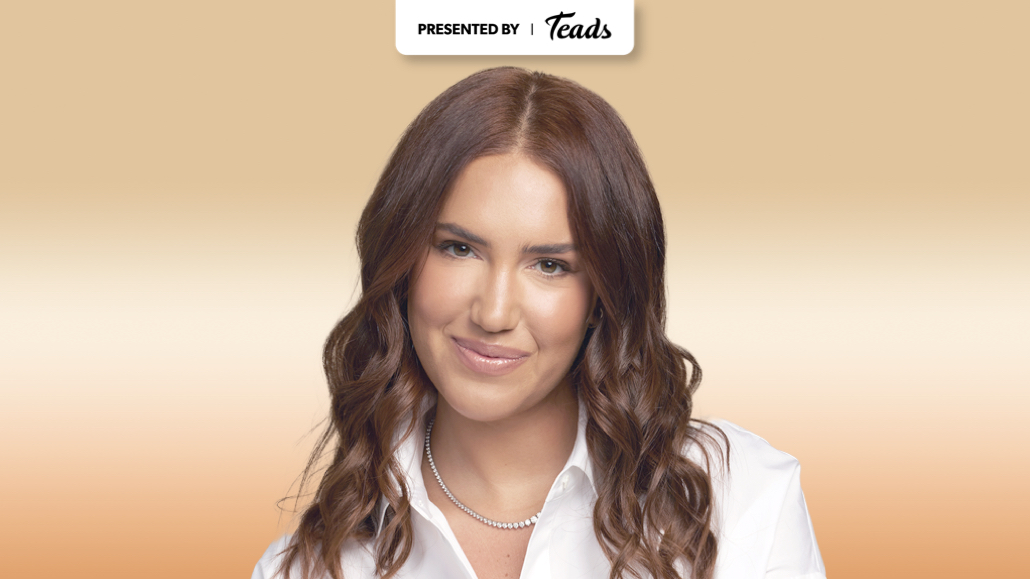Secure your place at the Digiday Media Buying Summit in Nashville, March 2-4
Why Tinx thinks AI will ‘end humanity’ and refuses to use it in content creation

Digiday covers the latest from marketing and media at the annual Cannes Lions International Festival of Creativity. More from the series →
As attendees at Cannes Lions 2023 sit around and discuss what form generative AI will — and should — take, creator Christina Najjar (better known as her nickname Tinx) has what seems like a hot take: she wants no part of artificial intelligence.
“I don’t like AI at all. AI will probably end humanity, and we’ll be lucky if it doesn’t. I’m more focused on that than sort of some of the more immediate implications,” Najjar said. “I know some creators are working with AI already. I don’t want to overly automate any aspect of my process right now.”
Najjar has been working on investing in her influencer brand for three years — and has grown it to include a merch deal under her “Rich Mom” series, hosting an ongoing podcast with SiriusXM and securing brand deals for her accounts, particularly across TikTok and Instagram.
This interview has been condensed and edited for clarity and length.
What’s your own relationship to AI?
I can’t think of where I would want to use AI instead of bouncing an idea off of a person or just going through the normal way. If that makes me old-fashioned, then so be it. I’m not really interested in AI. AI should be used to find cures to diseases and solve global warming. I really don’t think that we need to be eliminating any jobs in the creative space.
How do you feel about using ChatGPT (or tools like it) to brainstorm videos or to help generate content ideas?
That just doesn’t interest me. Even if it makes it more efficient, I would just rather speak to a person. There’s really no space for it in my world as of yet.
In terms of content creation, how do you think of audio versus video and the different formats and what channels you’ve shared what on?
Audio is very intimate. It’s very intimate to be in someone’s ear. There’s something very intimate about it because someone is usually doing something in private while they listen. So you really do have their attention more than, say, if they’re sitting in front of the TV and scrolling through TikTok mindlessly, or they’re on Instagram in between classes, like they might catch something, they might not.
With audio, I really have a chance to flesh out some of my bigger ideas and really connect with my community on them. And they go there with me. I’m so lucky that they do. But that’s kind of where I go deep. So whenever I have something, not necessarily more serious, but something that I just want to explore more than a 30-second Instagram story, I’ll go to audio.
How do you create content for different channels and the audiences on them?
I think about format a lot. Why do I go to TikTok versus why do I listen to a podcast? I wanna be informed. Of course, I wanna be entertained, but I really want to walk away with something. Whereas TikTok, I want to just be entertained. Instagram, maybe I want some escapism. So I really try to think about why people are going to a certain platform or media, and then delivering the content in that way.
How do you balance your influencing power and the decisions you make creatively?
I’ve always just created what I felt like I should create. That’s probably one of the reasons that I have found success. Trying to over-engineer a brand is so transparent and you can see when people are trying to do it really turns me off. So I just have never thought of it that way.
How does your mindset extend to which advertisers you work with?
I work with mostly brands and products that I genuinely love and it’s very easy for me to talk about things that I love. We’ve been very lucky in that sense.
More in Media

Media Briefing: Turning scraped content into paid assets — Amazon and Microsoft build AI marketplaces
Amazon plans an AI content marketplace to join Microsoft’s efforts and pay publishers — but it relies on AI com stop scraping for free.

Overheard at the Digiday AI Marketing Strategies event
Marketers, brands, and tech companies chat in-person at Digiday’s AI Marketing Strategies event about internal friction, how best to use AI tools, and more.

Digiday+ Research: Dow Jones, Business Insider and other publishers on AI-driven search
This report explores how publishers are navigating search as AI reshapes how people access information and how publishers monetize content.








